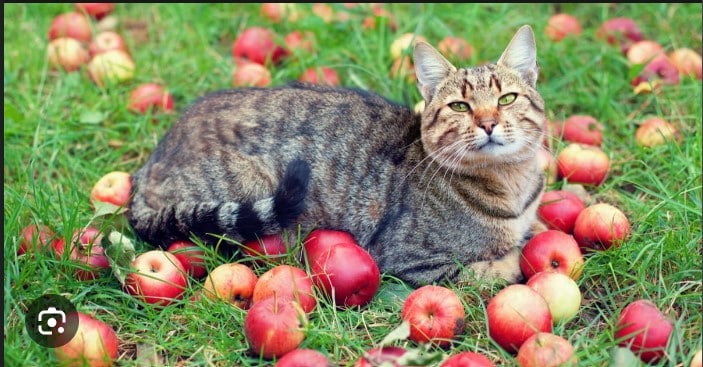Cats are naturally curious, and as good pet owners, we need to make sure they stay safe and healthy. A common question is whether cats can have apples. Even though apples are a healthy fruit for us, it’s important to check if they’re okay for our cats too. In this post, “Can Cats Eat Apples?”, we will tell you all you should know. We also talked about the Nutritional Composition of Apples and Benefits of Apples for Cats. As well as How to Safely Feed a Cat Apples and the Risks and Considerations.
Whether you’re making an apple pie or snacking on a crunchy apple with peanut butter, apples are a versatile and satisfying fruit. They’re rich in vitamins and fiber, making them a common part of our late summer and early fall diets. But what about your beloved cat? Can they safely enjoy this nutritious fruit?
While apples offer health benefits for us, it’s important to note that cats have different digestive systems that handle “human foods” differently. Some foods may be harmless or even good for a cat’s diet, while others can cause problems and have lasting effects. We shall discuss the implication of all of these in this post.
See also: Are Pothos Toxic to Cats?

Are Apples good for Cats?
Even though apples are healthy for humans, they’re not as good for our cats. Cats are obligate carnivores, meaning they mainly need nutrients from meat. They can’t process non-meat foods like humans and dogs can. While apple flesh won’t harm cats, it doesn’t offer much nutrition for them.
Apples have fiber that can upset a cat’s stomach, and their high sugar levels can affect blood sugar, especially in cats with diabetes or pancreatic issues. Apple stems, leaves, and seeds contain cyanide, which can be toxic in large amounts. So, giving a small amount of apple as a treat is okay for a healthy cat. However, it shouldn’t be a regular part of their diet. Always check with your vet before giving any fruit, especially if your cat has health issues or is prone to obesity.
What Kind of Apple can Cats Eat?
Cats can’t taste sweetness like we can, so they don’t have specific preferences for different apple varieties. However, it’s not a good idea to give them any random apple. Sweeter apples have more sugar, which can cause stomach problems and be risky for diabetic cats.
See also: Can Cats Eat Cherries?
Nutritional Composition of Apples
Apples are packed with important nutrients like fiber, vitamins, and minerals. They have vitamin C for a strong immune system, potassium for a healthy heart, and antioxidants that fight stress. Apples also have lots of water, helping with hydration.
But, cats have different nutritional needs than humans. Cats are obligate carnivores, meaning they mainly eat meat. Their bodies are built to get nutrients like protein and certain vitamins from animals. While fruits like apples can give some benefits, they should only be a small part of a cat’s diet, not a main food.

Benefits of Apples for Cats
Dietary Fiber
Apples contain fiber that helps with digestion and prevents constipation in cats. Adding a bit of apple to their diet can keep their digestive system healthy.
Hydration
Apples have lots of water, which is good for cats, especially if they don’t drink much water. Staying properly hydrated is important for things like kidney health.
See also: Is Lemongrass Safe for Cats?
Antioxidants
Apples have antioxidants like flavonoids and polyphenols that could be good for a cat’s health. These compounds help fight free radicals and contribute to overall well-being.

Risks and Considerations
Allergies
Just like people, cats can be allergic to certain foods. Before giving your cat apples, watch out for signs like itching, vomiting, or diarrhea to check if they have any allergic reactions.
Toxic Parts
While the actual apple flesh is generally safe, things like seeds and the core have cyanogenic glycosides that can release cyanide. It’s best to remove these parts before letting your cat have apples, even though the levels are usually low.
See also: Can Cats Eat Coconut?
Moderation is Important
Feeding too much of anything can upset a cat’s stomach. Cats have sensitive digestion, so it’s best to give them apples in moderation to avoid tummy problems.
High Sugar
Apples have natural sugars, which might be an issue for cats, especially those with diabetes or weight problems. Too much sugar can lead to weight gain and other health issues, so keep an eye on their overall sugar intake.

How much Apple can a Cat Safely Eat?
Not all cats are interested in apples, and that’s perfectly fine. It’s important to know that apples aren’t a very nutritious choice for picky felines; at most, it should be an occasional treat. Giving too much apple can upset a cat’s stomach, so if your cat enjoys it, make sure not to give them too much.
If you want to share apples with your cat, the best way is to wash and peel the fruit, remove the stem and seeds, and cut it into small ¼-inch squares. It’s safe to give a cat one or two small raw apple squares, but it’s easier for them to digest if the apple is cooked.
Keep the portion size limited to one or two ¼-inch squares once or twice a week. Giving more than that might lead to vomiting, diarrhea, gas, or stomach discomfort for your kitty.
See also: Are Monstera Toxic to Cats?
How to Safely Feed a Cat Apples
Get the Apples Ready Safely
Before giving apples to your cat, make sure they’re clean to remove any chemicals. Peel the apple and take out the seeds and core because they can be harmful.
Cut into Small Pieces
Cats might not be used to the texture of apples, so cut them into small, easy-to-eat bits. This makes it safer for your cat to eat and lowers the risk of choking.

Watch for Allergies
When introducing new food, watch your cat for any signs of allergies like itching, swelling, or stomach issues. If you see any problems, stop giving apples and talk to your vet.
See also: Can Cats Eat Raspberries?
Check Sugar Intake
Keep an eye on how much sugar your cat gets from different foods. If your cat has health issues like diabetes, talk to your vet before adding new treats.
Cooked or Raw?
Some cats like raw apple pieces, while others prefer them cooked. Test both to see what your cat likes, but make sure there are no added sugars, spices, or harmful ingredients.
Is Apple juice Safe for Cats?
Store-bought apple juice usually has a bunch of extra sugar, and even if you make it at home, it can still be pretty sugary, depending on the apples. If you’re making it from scratch with just apples, a little bit is probably okay. But the apple juice you find in stores has a bunch of sugar, chemicals, and preservatives, so it’s better to avoid those kinds.
See also: What Pet to Choose between Cat and Dog: See Reasons and Comparison.
Can Cats Eat Fruits?
Generally, cats don’t eat a lot of fruit, so the sugar in them isn’t a big worry, according to Gary Richter, a veterinarian. Apples are safe for cats, but there are some fruits they should avoid, like citrus (which has citric acid that can cause issues), grapes/raisins/currants (toxic to cats), and coconut or coconut oil (can upset their stomachs).

Should Cats Eat Apple?
The main point is: prioritize nutrients over treats. Since apples don’t provide all the necessary nutrition for cats, there’s no need to make an effort to include them in their diet. However, if your cat is persistently asking for a bite, it’s safest to follow the advice mentioned earlier.
If you’re not sure whether your cat is getting the right nutrients from its daily food, talk to your vet. They can help you find good options for your pet, and no question (or treat!) is too small to discuss. Keeping an open and honest conversation with your vet is crucial for ensuring your cat stays safe and healthy.
See also: Are Poinsettias Poisonous to Cats?
Conclusion
In summary, it’s okay for cats to have apples in moderation, but it’s important to be aware of potential risks and take necessary precautions. While apples can offer some nutritional benefits like fiber, hydration, and antioxidants, they shouldn’t replace a well-balanced, meat-based diet that meets a cat’s unique nutritional needs.
As responsible pet owners, prioritizing your cat’s health is crucial. Before adding any new food to their diet, consult with your vet to ensure it suits their specific dietary requirements and health conditions. With careful consideration and moderation, you can occasionally treat your cat with apples as part of a balanced and well-rounded diet.
See also: https://www.lovenala.com/blogs/nalas-blog/6-of-the-healthiest-vegetables-for-cats

